The Key to Opposing Trump 2.0? Direct Democracy

The second Trump administration is underway, and conservative officials across the country appear emboldened. There is no question: our freedom to live, speak, vote, marry, raise a family and access health care is under attack.
In 2024, we saw these types of attacks firsthand through our work to protect reproductive freedom via direct democracy. In states with some of the most egregious abortion bans, state officials led the charge, attacking reproductive freedom ballot measures at every step of the process: in Montana, the secretary of state attempted to disqualify valid petition signatures; in Missouri, the attorney general refused to conduct his ministerial duty to approve the measure’s fiscal impact assessment.
Democracy Docket is a fearlessly independent and pro-democracy news outlet that will hold the next administration accountable — sign up for our free daily and weekly newsletters to get the latest voting and democracy updates sent straight to your inbox.
Florida faced the most significant governmental sabotage — from the attorney general attempting to block the measure, to the state manipulating the amendment’s fiscal impact statement and sending police to the doors of individuals who signed the reproductive freedom petition, to the health department attempting to shut down the campaign’s TV ads by threatening TV stations with criminal prosecution, to the DeSantis administration utilizing tens of millions of taxpayer dollars to run “public service announcements” against Amendment 4 — the state pulled out every stop to defeat the measure. In Arkansas, the state succeeded in removing the reproductive freedom measure from the ballot by arguing that the proponents had failed to submit signature gatherers’ documentation.
We also saw unprecedented attacks from anti-abortion activists. From legal challenges arguing that a measure is too confusing to litigation arguing the entire measure should be invalidated based on spurious petition allegations, we saw more aggressive, more frequent attacks this cycle. Anti-abortion campaigns also attempted to confuse and manipulate voters.
On top of all that, we faced electoral headwinds that saw nearly 90% of counties nationwide shift in favor of the misogynist, authoritarian president. From Arizona to Montana and from Florida to Missouri, the electorate shifted in favor of a president who routinely spreads misinformation about abortion and has bragged about his role in overturning Roe v. Wade.
As we continue to grapple with what happens next, now is the time to ensure that our freedoms are protected.
Yet, despite these barriers and headwinds, voters in seven states chose to protect reproductive freedom through direct democracy. Not only did these measures win, some of them won big: the Colorado measure won almost 62% of the vote; the Arizona measure won 63% of the vote and in ruby-red Montana, 57% of the voters supported the measure to protect reproductive freedom. Even in states where the measure failed, the margins were close: the Nebraska measure received 49% of the vote and the Florida reproductive freedom measure garnered 57.2% of the vote, only failing because constitutional amendments in Florida must receive 60% of the vote to pass. The Florida measure even out-performed Trump, who only won 56.1% of the vote.
There is no doubt that Americans want their freedoms protected and ballot measures are a critical, effective tool to ensure we protect those freedoms. But there is also no doubt that officials across the country, and those in the White House, will continue to try to take those freedoms away, and further attack the right of citizens to use the initiative petition process to place measures on the ballot.
For the next four years, progressive organizations will mount efforts to resist many of the policies of the second Trump administration and a Republican-controlled Congress. And they must, in order to protect our freedoms. But it is not enough to simply play defense. Ballot measures are fundamentally a tool for policy change, but they are also an effective way to put a beleaguered resistance on the offense. Ballot measures are essential building blocks to the country that we want — no matter who is in the White House.
The headwinds will continue to be against us in 2025. We are facing an increasingly authoritarian federal government — and state governments that are following suit — that will not limit their ambitions to undermining our reproductive freedoms. Activists and organizers should expect fierce, well-funded resistance from the state, right-wing activists and conservative campaigns.
As we continue to grapple with what happens next, now is the time to ensure that our freedoms are protected. In too many states, abortion access has already been severely restricted or eliminated altogether. Even with the threat of a national abortion ban looming, we cannot stop investing in state-based solutions — now is the time to dig in, not lean out.
As a proven next step, we need more measures: we need them to start earlier, be more strategic and have more funding. We have to be ready for well-resourced, state-sponsored attacks on democracy, including having the legal support necessary to resist an increased number of manufactured criminal threats for simply engaging in free speech.
We must continue to support and invest in state-based organizations working on the ground, because they know how to win in tough political climates. And, we need to ensure that we protect direct democracy and access to the ballot measure process.
Finally, we need this all now. The citizen initiative is a critical tool — and the most powerful way in this moment — to protect our freedoms.
Lauren Brenzel was the director of the Yes on 4 Campaign, a 2024 proposed constitutional amendment to protect abortion rights in Florida.
Rachel Sweet is the campaign manager for Missourians for Constitutional Freedom Campaign.
Emma Olson Sharkey is a partner at Elias Law Group where she focuses on progressive ballot measures.